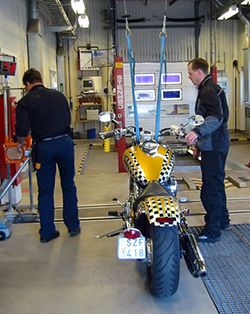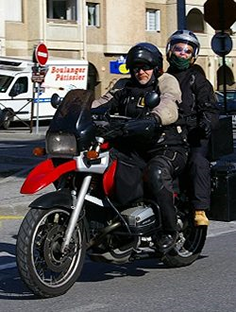 After yesterday’s European Plenary session at the Parliament in Strasbourg for the vote concerning the Road Worthiness Testing proposals from the European Commission, FEMA (Federation of European Motorcyclists’ Associations) as the representative of their members, i.e. European Riders’ Organisations, has released some information on what happened in the vote.
After yesterday’s European Plenary session at the Parliament in Strasbourg for the vote concerning the Road Worthiness Testing proposals from the European Commission, FEMA (Federation of European Motorcyclists’ Associations) as the representative of their members, i.e. European Riders’ Organisations, has released some information on what happened in the vote.
Similarly SMC (Swedish Association of Motorcyclists) and FFMC (French Federation of Angry Bikers) have released independent information for their members and respective motorcycle communities in their own countries.
Several of the rider organisation representatives were present at the vote in Strasbourg including, Morten Hansen (NMCU), Eric Thiollier (FFMC), Dolf Willigers (MAG NL) and Chris Hodder (BMF).
However, the final vote by the EU Parliament on the amendments, which brought motorcycles back into mandatory RWT, was postponed and referred back to the TRAN committee (Transport and Tourism) committee, chaired by UK MEP Brian Simpson, to begin discussions with the Council of Ministers and the European Commission.
The European Commission’s position is to include motorcycles within RWT, the Council of Ministers deleted motorcycles from their position, TRAN had also deleted motorcycles with a compromise to look at the statistics within three years to see if RWT for motorcycles is necessary either to mandate or leave this decision to member states. For example in the UK we already have RWT, commonly known as the MoT and this would not change.
Although Chris Hodder (Government Relations) from the BMF, has stated that this (the vote to include amendment 117 – see below) is a defeat but at the same time, not a victory for the European Commission, we would consider that this is all part of the parliamentary procedure. In other words, it isn’t over until the Barber Shop Quartet (or in this case the Barber Shop Trio i.e. the Commission, Parliament and Council ) join together in harmony!
As the EU Parliament has said, “Parliament adopted amendments to the Commission proposals on Tuesday which it wants to be the basis for negotiations with Council with a view to agreeing the revised legislation at first reading.”
At Right To Ride we are rounding up information from all our sources and will have a full report on the vote on Road Worthiness Testing and its meaning for motorcyclists.
The Federation of European Motorcyclists’ Associations
2nd July 2013
Parliament strongly divided on the need to include Powered Two-Wheelers into European technical inspections
European Parliament Members (MEPs) voted to include powered two wheelers (PTWs) into the Commission’s periodical technical inspections (PTI) proposal but voted to go into informal discussions until an agreement is found with the Council.
During today’s Plenary Meeting in Strasbourg, MEPs voted in favour of reintegrating powered two wheelers (PTWs) into the Commission’s periodical technical inspections proposal. Whilst this is a defeat for FEMA’s campaign to exclude motorcycles, the fact that the vote was close and the discussions are continuing is not a victory for the Commission.
While institutional views (Council, IMCO, TRAN) had been in constant agreement up to now with motorcycle safety experts (such as Rune Elvik[1]), or Member States well-known for their safety outcomes (e.g. The Netherlands, Sweden, France), Socialist and Green MEPs headed by Isabelle Durant (Greens/Belgium) and Saïd el Khadraoui (Socialists/Belgium) stuck to their “position of principle” and managed to overturn, by a tiny majority, the compromise amendment negotiated and adopted in the Transport Committee.
With their amendment calling for “improved safety for motorcyclists” backed up with flawed Commission statistics provided by the periodic testing industry, MEP Durant and el Khadraoui are not only opposing their own government position, they also turned themselves into ‘motorcycle safety experts’, without EU motorcycling knowledge or any PTW safety expertise. Furthermore, neither of them agreed to meet with FEMA.
FEMA was supportive of the TRAN compromise amendment as it called the Commission to provide new and unbiased evidence comparing safety results between countries with and without PTI before proposing to include L-category vehicle into the scope by 2016.
With today’s Plenary vote, European motorcyclists have indeed lost a battle. But with such a tight vote (322/354), the Parliament is also showing how divided it is on this issue.
Further to reintegrating PTWs in the Parliament’s text, MEPs sent it back to TRAN to find a compromise with the Council in view of an adoption in first reading before the end of the legislative period. Discussion with the Council will start after the summer break.
Several FEMA Committee members were at the vote, including Morten Hansen (NMCU), Eric Thiollier (FFMC), Dolf Willigers (MAG NL) and Chris Hodder (BMF). After the vote, Wim Van De Camp (CDA/NL) came out to explain to the many motorcyclists assembled the meaning of the vote.
Chris Hodder said: “Whilst this is a defeat for FEMA, it is not a victory for the Commission. Discussions will continue and we hope and expect that FEMA will be fully consulted on proposals that affect the millions of motorcyclists in the EU.”
Original Source – Click Here
EU Parliament divided on survey question
3rd July 2013
MEPs voted on Tuesday, July 2 for the introduction of mandatory inspection of two-wheel motor vehicles. The final vote was postponed, instead begin discussions to reach a compromise with the Council of Ministers and the European Commission. The decision is a defeat for the SMC and the member organizations of FEMA. However, the results were consistent and the issue is not over yet!
Ministers (EU governments) and the two committees in the European Parliament TRAN IMCO and has always been in agreement with road safety experts that the mandatory inspection is not the solution to reducing accident rates among motorcycle and moped owners. There is simply no evidence that more motorcyclists die in the country without inspection. A good comparison is here in the North where only Sweden kontrollbesiktar motorcycles but accident rates are comparable or worse than in Norway, Denmark and Finland. SMC has urged the Swedish MEPs supporting TRAN’s proposal which requires the Commission to study and compare accident statistics between countries with and without inspection within three years, before making any decisions about including motorcycles and mopeds in the proposal relating to 40 million vehicle owners in Europe.
I managed two political groups in parliament have brought a majority of MPs (322-354) to vote for the inclusion of two or three motorcycles from 1 January 2016. The decision also means that mopeds be included from 2018, depending on the outcome of the Commission’s study to be conducted.
The narrow majority clearly shows that Parliament is divided on the issue, and therefore no victory for the Commission who proposed. After the summer break will begin discussions between responsible in Parliament TRAN, Ministers and the Commission to try to get a decision in place before next summer when there are elections for parliament.
SMC has had contact with political representatives in the European Parliament in the survey question and received statements from some of them.
Christofer Fjellner (m): T here was a remarkably stupid decision. The logic behind the decision we should start checking inspect pedal bikes because accidents are said to be due to technical errors. It is quite wrong, therefore we suggested that motorcycles and mopeds would be removed from the proposal. I’m worried about the future because of Ministers decision to exclude motorcycles and mopeds were taken with a small mariginal. I assume that the government in power will maintain the former Swedish position and hold motorcycles and mopeds outside proposal.
Ulvskog (s): “The decision was not what we wanted. Harmonised rules for inspection increases road safety and reduce road traffic environmental impacts. We believe, however, that required routine inspections shall include motorcycles and mopeds so we voted no., We had wanted to see a more thorough and more comprehensive study of the Commission on two-and three-wheelers. The final vote was postponed so that a possible first reading agreement can be made with the Commission and the Council. This means that the government must press on. “
From ALDE (Liberal and c): “We voted in line with TRAN but to no avail., It is no doubt that road safety is an important European issue. Vehicles crossing the borders and some common rules are needed to reduce accidents our roads in Sweden and in the rest of Europe. But European rules must strike a balance between enhanced security and micromanagement which could hamper efforts nationally and locally., we do not think that this text achieved a sufficient balance but went too far in some detail control. Therefore we abstained in the final vote for the negotiating mandate., we hope that the negotiations with the Council is now leading to a final text that enhances safety on European roads without creating too complicated and expensive systems. “
Now the discussions begin between responsible TRAN and the Council of Ministers to try to get a decision in place before next summer when there are elections for parliament. SMC will obviously be in contact with the Government and Transport Agency involved in the negotiations with the Parliament and the Commission.
When the vote was FEMA’s staff and representatives from some of FEMA’s organizations on the ground, including NMCU, NL MAG and BMF.
Original Source – Click Here
The European Parliament calls for the technical control of the two wheels powered by 2016
2nd July 2013
Consternation among the representatives of the present European Motorcyclists this Tuesday, July 2 in Strasbourg on the occasion of the vote on the package technical control.
Returning to the compromise adopted in Commission transport may 30, MEPs were indeed reinstated during the vote in plenary both wheels motorized in the scope of application of the European regulation on roadworthiness. A short majority, they chose not to wait the results of the study requested the European Commission to assess the usefulness of this measure.
The previous week, amendments to implement a periodic technical inspection to some or all categories of two motorized wheels had been deposited by French, Belgian and Romanian members.
This is the belgo-roumaine position of Isabelle Durant and Silvia-Adriana Ticau which was chosen by the majority of MEPs. It offers a technical on the same periodicity control whether automobiles (4 years-2 years-2 years).
French, Dutch, Swedish MEPs, who had been mobilized by their respective countries motorcyclists associations voted together against the technical control motorcycle. But facing the majority of countries that already have such regulatory measures, it was not enough.
The part is not for all lost for bikers and for European citizens face lobbying of the technical control industry more broadly. Indeed, the European Council has already, and almost unanimously, adopted a position diametrically opposed to the path chosen by the European Parliament today.
The trialogue will therefore continue between European Parliament, European Commission and Council of Ministers of the European Union to find a way out to this folder.
The FMWC, the MFF and the CODEVER, who have spared no efforts in the course of the past year, are already studying the best ways to regain the advantage.
They however thank the whole of the French MEPs who are committed to their sides against the measure unnecessary and costly.
Original Source – Click Here
European Parliament strongly divided on including Powered Two-Wheelers into EU technical inspections
3rd July 2013
European Parliament Members (MEPs) voted to include powered two wheelers (PTWs) into the Commission’s periodical technical inspections (PTI) proposal but voted to go into informal discussions until an agreement is found with the Council.
During the Plenary Meeting on 2 July in Strasbourg, MEPs voted in favour of reintegrating powered two wheelers (PTWs) into the Commission’s periodical technical inspections proposal. While institutional views (Council, IMCO, TRAN) had been in constant agreement up to now with motorcycle safety experts (such as Rune Elvik ), or Member States well-known for their safety outcomes (e.g. The Netherlands, Sweden, France), a number of MEPs stuck to their “position of principle” and managed to overturn, by a tiny majority, the compromise amendment negotiated and adopted in the Transport Committee.
Further to reintegrating PTWs in the Parliament’s text, MEPs sent it back to TRAN to find a compromise with the Council in view of an adoption in first reading before the end of the legislative period. Discussion with the Council will start after the summer break.
Original Source – Click Here
Amemdment 117
1. This Regulation shall apply to vehicles with a design speed exceeding 25 km/h of the following categories, as referred to in Directive 2002/24/EC, Directive 2007/46/EC and Directive 2003/37/EC:
– from 1 January 2016 two- or three-wheel vehicles – vehicle categories L3e, L4e, L5e and L7e,
– wheeled tractors with a maximum design speed exceeding 40 km/h – vehicle category T5.
1a. This Regulation shall apply as from 1 January 2018 to the following vehicle categories unless the Commission demonstrates in its report under Article 18a that such a measure would be ineffective:
– two- or three-wheel vehicles – vehicle categories L1e, L2e and L6e.
Article 18a
Reporting
No later than [five years from the date of publication of this Regulation], the Commission shall submit a report to the European Parliament and the Council on the implementation and effects of this Regulation, in particular as regards the inclusion of vehicles of categories L1e, L2e and L6e within its scope, the frequency of testing, the level of harmonisation of periodic roadworthiness tests and the effectiveness of the provisions on the mutual recognition of roadworthiness certificates in cases of re-registration of vehicles originating from another Member State.
That report shall also analyse whether there is a sufficient level of harmonisation to allow for full mutual recognition of roadworthiness certificates throughout the Union and whether there is a need for higher European standards in order to achieve such recognition.
The report shall be accompanied, if appropriate, by legislative proposals.
Leave comments on Right To Ride EU – Click Here


